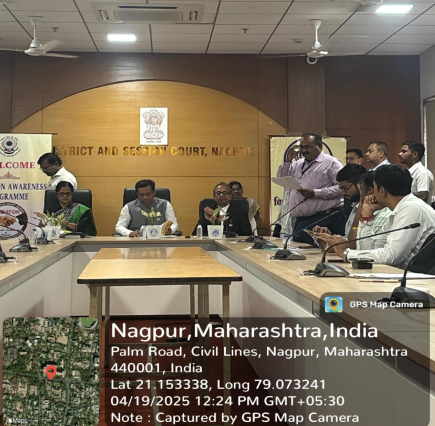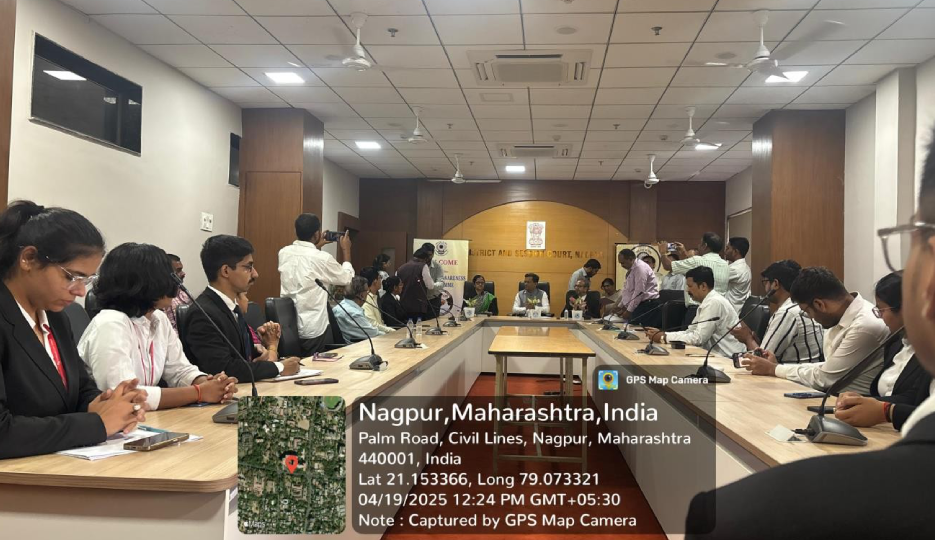Happenings
The Legal Aid Centre of Symbiosis Law School, Nagpur, had the privilege of participating in the Mediation Conference organised on 24th April 2025 by the District Legal Services Authority (DLSA), Nagpur, in collaboration with the Legal Aid Centre, Nagpur.

The event was held at the District and Sessions Court, Nagpur, and brought together students from various law institutions such as RTMNU, GH Raisoni Law School, and Dr. B.R. Ambedkar College of Law.
From our college, a delegation of 12 students from the Legal Aid Centre actively participated in the conference. The primary objective of the event was to spread awareness regarding the importance of mediation as a method of Alternative Dispute Resolution (ADR) and its growing relevance in today’s legal framework.
Felicitation and Opening Ceremony
The conference began at approximately 12:45 PM with a formal felicitation ceremony, wherein the distinguished dignitaries were welcomed with flowers and mementoes. Each of them introduced themselves to the students and briefly shared their professional journey. A member of the organising council then presented the agenda for the day, outlining the key topics and sessions scheduled for the conference.
Session Highlights
Introduction to Mediation
The speakers provided an insightful introduction to mediation—its meaning, significance, and advantages over traditional litigation. They emphasised how mediation focuses on peaceful dispute resolution through dialogue and helps reduce the burden on the courts.
Evolution of ADR Mechanisms
The evolution of Alternative Dispute Resolution was discussed in detail, with an emphasis on how mediation has grown over time as a preferred method in various legal and commercial sectors.
Legal Framework and the Mediation Act
The dignitaries highlighted the existing legal framework surrounding mediation, including key provisions under the Civil Procedure Code (Section 89) and the Arbitration and Conciliation Act.
A notable point of discussion was the Mediation Act, which has either recently been introduced or is in the process of being enacted. The Act is expected to bring structured reforms to mediation practices in India and aims to institutionalise mediation and promote mandatory pre-litigation mediation in certain cases. The speakers stressed the importance of this development and encouraged students to stay updated and involved in the ADR space.
Fields of Application
The practical application of mediation was explained through real-life examples in areas such as:
- Matrimonial and family law
- Consumer disputes
- Labour and employment law
- Business and commercial matters
Mediation was described as a cost-effective and time-saving alternative that upholds the dignity and privacy of disputing parties.
Interactive Session and Student Experience
The event included an interactive Q&A session, where students were allowed to engage with the panel and gain clarity on the practical aspects of becoming a mediator, the required skills, and the training pathways. The dignitaries encouraged students to view mediation as a valuable career path, citing its expanding role in both public and private legal sectors.
Conclusion
The Mediation Conference proved to be a highly insightful and transformative experience for the student participants. It deepened their understanding of ADR mechanisms, the evolving legal landscape, and the importance of soft skills such as patience, empathy, and neutrality in dispute resolution.
Our 12-member delegation from Symbiosis Law School, Nagpur’s Legal Aid Centre, found the event academically enriching and professionally inspiring. The discussions surrounding the upcoming Mediation Act particularly stood out as a call for future legal professionals to actively contribute to and shape the development of ADR in India.



